Key takeaways:
- Energy-efficient hardware reduces energy consumption, leading to lower utility bills and a decreased carbon footprint.
- Choosing devices like Energy Star appliances enhances performance and could provide tax incentives or rebates.
- Future trends include adaptive technologies and increased use of renewable energy sources, like solar power, for smarter energy consumption.
- Upgrading to energy-efficient technology not only enhances productivity but also allows for greater leisure time and enjoyment at home.
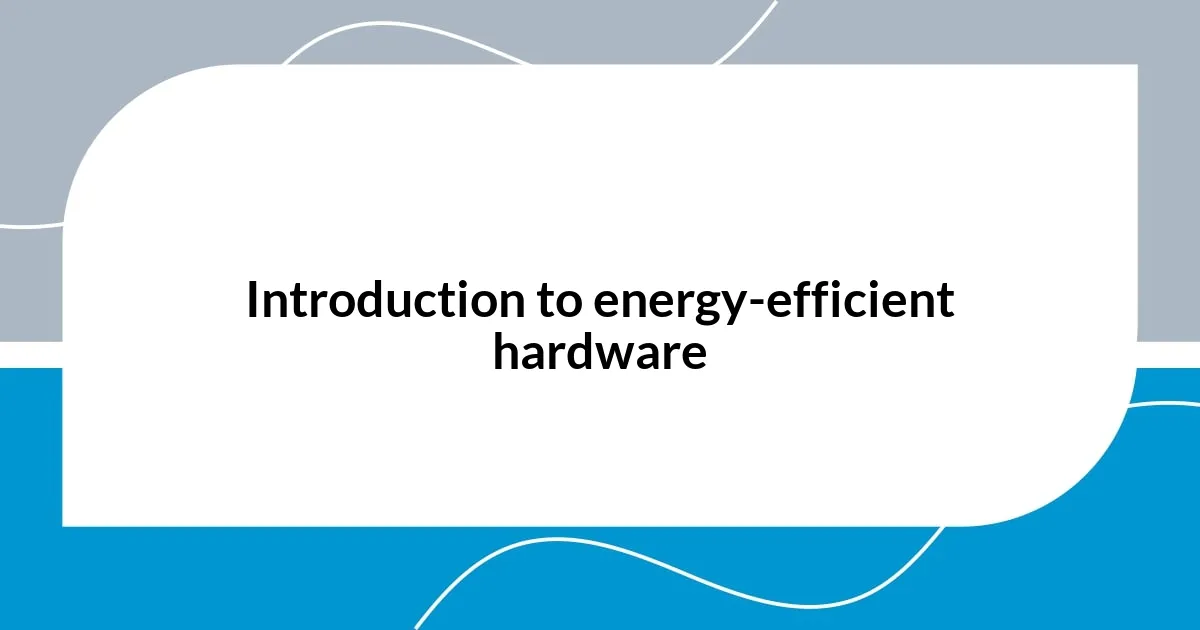
Introduction to energy-efficient hardware
Energy-efficient hardware refers to devices and systems designed to use less energy while maintaining performance. I remember the first time I upgraded my home office with energy-efficient equipment; it felt like I was stepping into the future, not just because of the technology but also the positive impact I knew it would have on my energy bills. Have you ever wondered how much you could save by making just a few changes?
The beauty of energy-efficient hardware lies in its dual advantage: reducing environmental impact while also saving money. When I switched to an energy-efficient monitor, the difference in power usage was staggering—less energy consumed meant not only a lower utility bill but also a sense of satisfaction knowing I was doing my part to conserve resources. Isn’t it rewarding to make choices that benefit both our wallets and the planet?
Investing in energy-efficient hardware is increasingly relevant in our modern, tech-driven world. I often find myself reflecting on how our collective habits contribute to global energy consumption, and every small shift counts. Have you experienced similar moments of realization when considering your own energy use? Each personal choice can lead to a much larger impact.
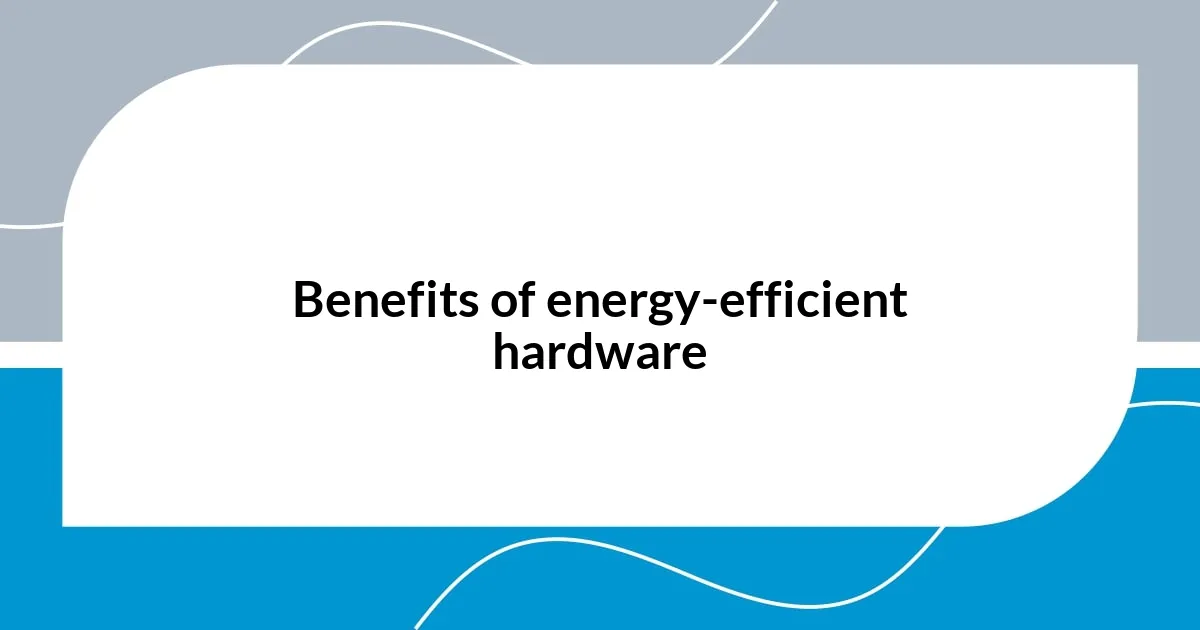
Benefits of energy-efficient hardware
Energy-efficient hardware can transform not only your experience with technology but also your monthly expenses. I recall my first energy-efficient laptop purchase, and the instant reduction in my electricity bill felt like a small victory. The peace of mind knowing I was reducing my carbon footprint added a layer of fulfillment I hadn’t anticipated.
The benefits extend beyond personal savings to broader impacts that resonate deeply with our environment and lifestyle. Here are some key benefits that I’ve personally observed:
- Lower Energy Bills: By using devices that consume less power, I noticed a significant drop in my monthly utility costs.
- Extended Device Lifespan: Energy-efficient hardware often runs cooler and more reliably, which means my investment lasts longer.
- Quieter Operation: Many energy-efficient models come with improved cooling systems, making them quieter and creating a more pleasant workspace.
- Tax Incentives and Rebates: I was pleasantly surprised to find that certain purchases qualified for local energy rebates, giving me further financial support.
- Enhanced Performance: I’ve found that these devices don’t just save energy; they often run faster and smoother, enhancing my productivity.
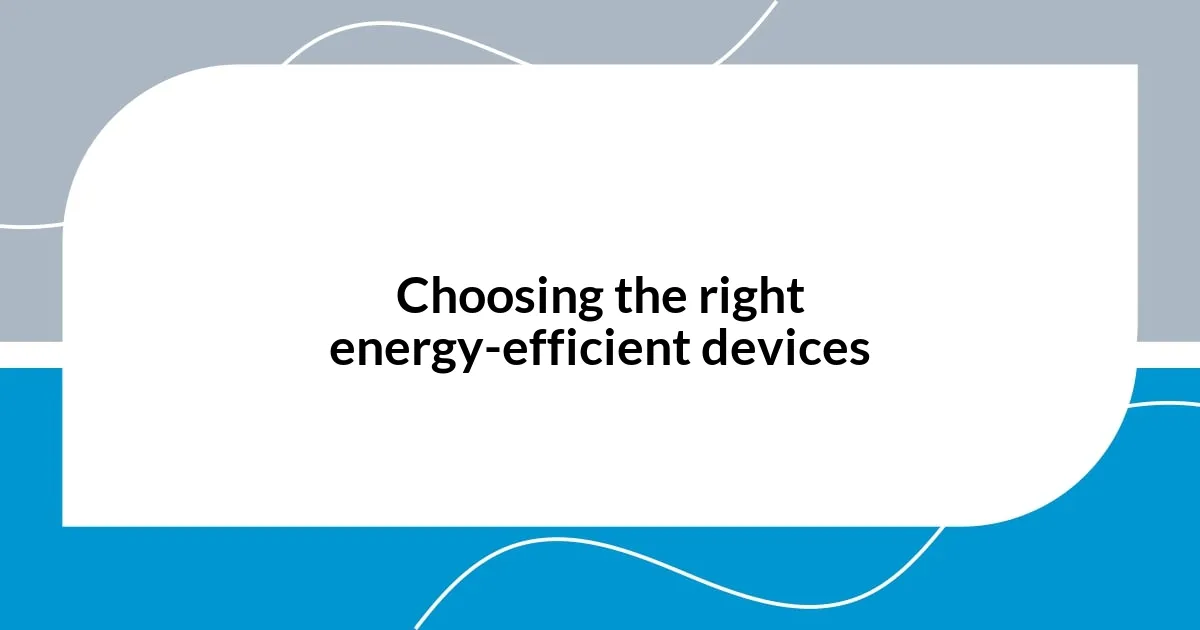
Choosing the right energy-efficient devices
Choosing energy-efficient devices can initially feel overwhelming, but I’ve learned that simplicity is key. When I decided to upgrade my appliances, I focused on the Energy Star rating, a reliable benchmark for energy efficiency. I remember walking into an electronics store, armed with research, and feeling more empowered to make informed choices that would impact both my bills and the environment positively.
One insightful approach is comparing specific features that matter to your needs. For instance, while selecting a new refrigerator, I considered its size, energy consumption, and additional features like an inverter compressor, which improves efficiency. I can’t stress enough how beneficial it was to ask questions and gather firsthand experiences from friends who had made similar upgrades. Each conversation helped shape my decision-making process, revealing how effective these devices could be in real-life scenarios.
As I navigated my choices, I recalled how the up-front costs of energy-efficient devices can often be higher but realizing the long-term savings made it worthwhile. After purchasing an energy-efficient washing machine, I was amazed at how quickly the wash cycle completed without compromising cleanliness. Moreover, the anticipation of cheaper bills created a sense of excitement that continued long after the purchase.
| Device | Energy Efficiency Features |
|---|---|
| Smart Thermostat | Learning capabilities and remote access |
| LED Light Bulbs | Long lifespan, lower wattage, instant brightness |
| Energy Star Refrigerator | Inverter technology, optimal storage solutions |
| Energy-Efficient Monitor | Adaptive brightness, low power consumption |

Cost savings from energy efficiency
The cost savings from energy efficiency have been truly noticeable for me. After switching to LED light bulbs throughout my home, I couldn’t believe the difference it made in my electricity bill. Seeing those figures drop gave me a sense of accomplishment—I felt like I was winning on two fronts: saving money and being more environmentally conscious. Have you ever checked your energy bill after making a small change? You might be pleasantly surprised.
I also remember the first time I invested in an energy-efficient dishwasher. Initially, I hesitated at the higher price tag, but that decision quickly paid off. The savings on my monthly water and energy bills were substantial, and the convenience of not hand-washing my dishes was a game-changer. It’s funny how, sometimes, the right choice isn’t the easiest one, but it can lead to unexpected joy.
Every time I upgrade a device, I make it a point to track the savings. Recently, I swapped out an old computer for a more energy-efficient model. I expected to save on electric costs, but I didn’t anticipate how much the decreased energy consumption would reflect in my budget. It’s almost like a little treasure hunt—finding savings where I least expected them. So, if you’re contemplating any changes, consider how those choices could ripple positively through your finances.
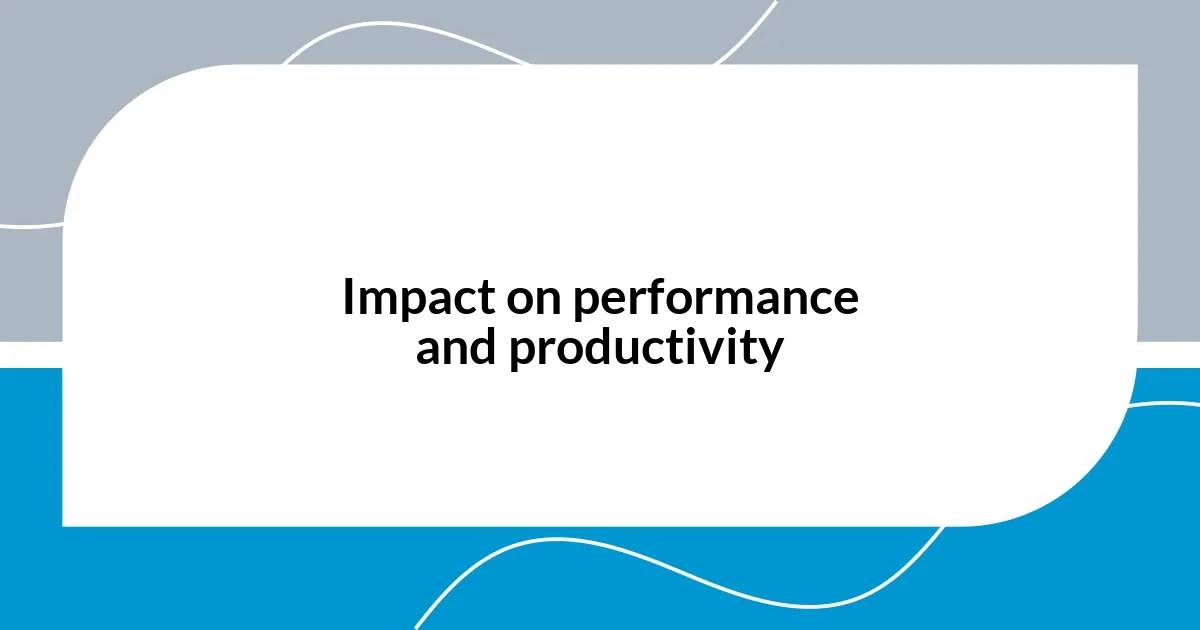
Impact on performance and productivity
Switching to energy-efficient hardware has significantly boosted my overall performance at work. I recall the day I set up my new energy-efficient monitor. The adaptive brightness feature not only reduced eye strain but also made my multitasking during long hours more manageable. Have you ever experienced a sudden surge in productivity just because your workspace felt more comfortable? That’s exactly how I felt, and it reflected in my output.
One standout moment was when I upgraded my old desktop for a sleek, energy-efficient model. To my surprise, it not only consumed less power but also booted up faster. I found myself getting through tasks more efficiently, allowing me to finish projects ahead of deadlines. It’s incredible how the simple act of optimizing my equipment could lead to such a noticeable impact on my productivity levels. If you haven’t tried making the switch yet, you may want to rethink what a difference it can make.
Interestingly, I’ve also noticed that using energy-efficient appliances at home allows me to channel my newfound energy into leisure activities. Less worry about bills means more time for hobbies and family. I remember the last time I was able to spend an entire weekend gardening, free from stress about energy costs. This balance of productivity at work and joy at home has been a life changer for me—a rewarding combination I had never expected from simple hardware choices.
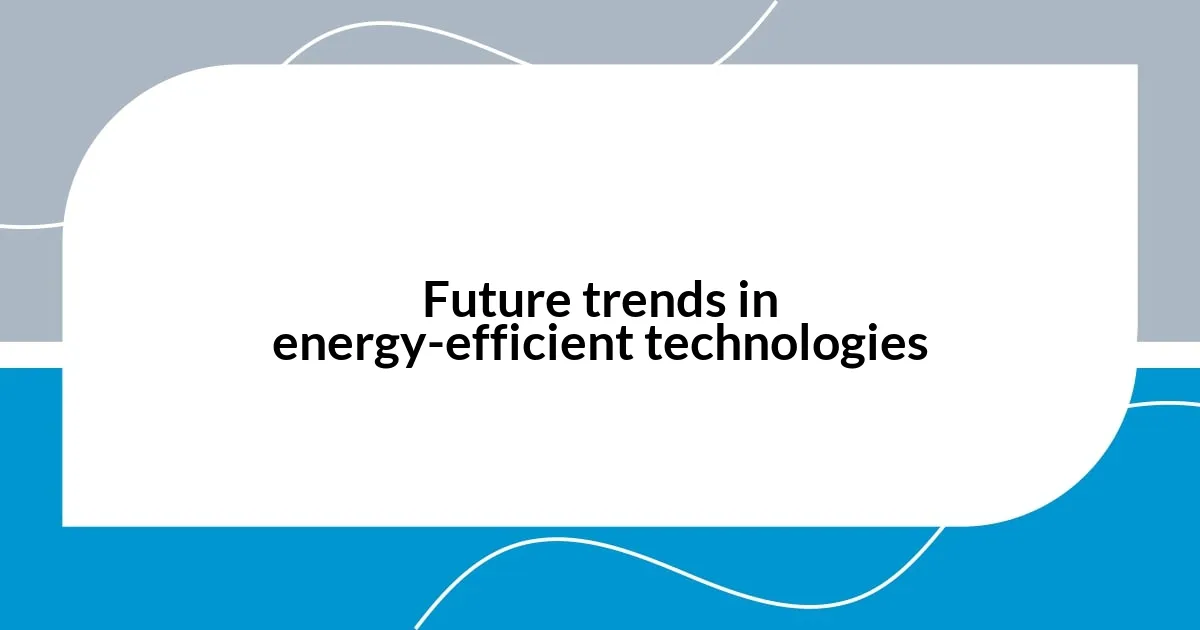
Future trends in energy-efficient technologies
The future of energy-efficient technologies is something I find incredibly exciting. As I follow recent developments, I see a shift towards adaptive technology that learns from user behavior, optimizing energy use in real-time. Imagine a smart thermostat that not only adjusts to your schedule but also anticipates your needs based on past patterns. Have you ever wished your devices could just “know” you better? While this may sound futuristic, it’s already in the works and could radically change how we consume energy in our daily lives.
I’ve noticed an increasing emphasis on renewable energy sources, particularly solar technology. The advancements in solar panels are phenomenal, with newer designs becoming more efficient and affordable. Last summer, I installed a small solar panel system at home, and I was amazed by how much energy I saved during those sunny days. The feeling of generating my own energy was empowering! Wouldn’t it be fantastic if more households could tap into this clean energy source?
Another trend I think will gain ground is the integration of energy-efficient technologies into everyday appliances. For instance, kitchen gadgets that adjust their energy consumption based on usage patterns or even communicate with each other to optimize overall efficiency. The joy I experienced when my energy-efficient fridge kept my food fresher while using less power was remarkable. I can’t help but wonder what future innovations will surprise us. It feels like we’re only scratching the surface of what’s possible.